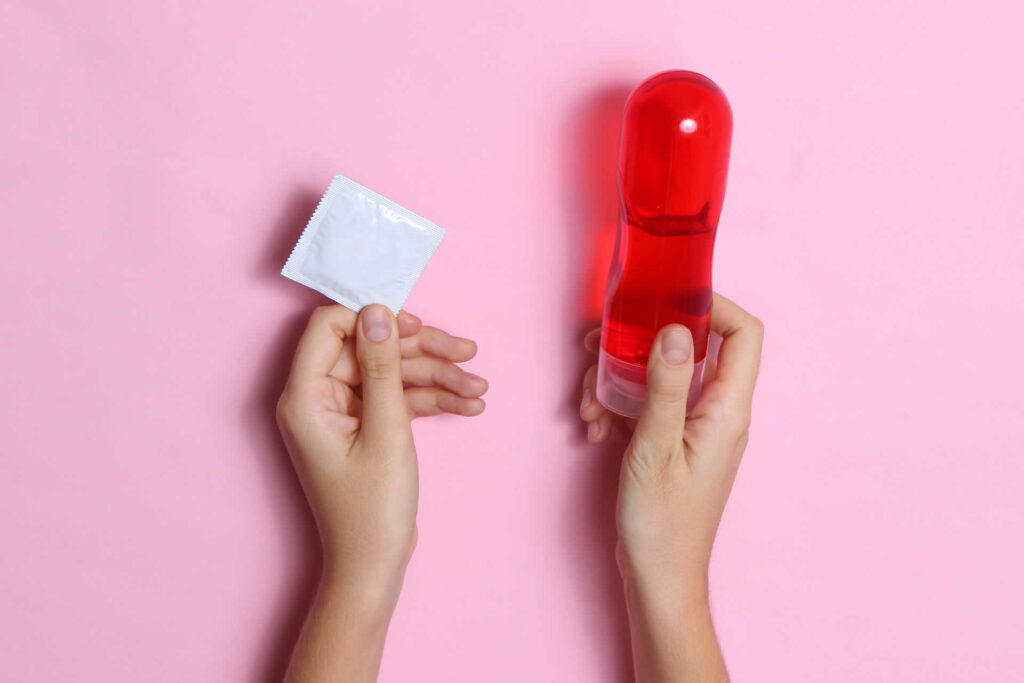
What are Condoms?
A condom is a thin rubber sheet worn over an erect penis, inserted into the vagina or anus before one engages in sex, to prevent HIV, pregnancy, and other sexually transmitted infections (STIs). Some examples of STIs include syphilis, gonorrhea, chlamydia, herpes, human Papilloma Virus (which causes genital and anal warts). Condoms work by preventing the exchange of bodily fluids like pre-cum, cum, and vaginal fluid between two or more persons.
Basic Facts about Condoms
- Condoms are widely available in Nigeria (in all chemist and pharmacy shops) and are affordable.
- Various kinds of male condoms will offer you different sexual experiences. For example, lidocaine-made condoms may allow a man who ejaculates easily to last longer.
- Condoms can be valid for up to 5 years from the day they are produced
- When used correctly and consistently, male condoms are estimated to be 90 percent effective in reducing HIV transmission.
- Female condoms can reduce HIV transmission by as much as 94 percent when used correctly with every intercourse.
- Male and female condoms are the only barrier methods that offer dual protection. This means that male and female condoms offer significant protection against both HIV and other STIs and unintended pregnancy.
Condoms do not need a prescription, like drugs, so anyone can use them without any form of prescription. Condoms can be purchased from chemist and pharmacy shops without having to visit a doctor
- Condom use can be enhanced with water-based lubricant, as it helps prevent condom breakage and can make sexual activity more comfortable and pleasurable.
What is the Correct Way to Use a Condom?
General Information
For condoms to work well, it is important to keep to the following guides:
- Store condoms in a cool place, away from direct sunlight. This will prevent heat or sunlight from damaging it.
- To avoid damaging condoms, DO NOT place them under any weight or in the back pocket
- DO NOT use expired condoms. Always check the expiration date on the condom wrap, not the box.
- Run your finger around the edges of the condom packet, you will notice rough (serrated) edges, carefully tear off the condom packet from the rough edge to remove the condom. Do not use the teeth, or any sharp objects to open the condom packet.
Male Condoms
- Use the thumb and index finger of one hand to hold the tip of the condom to remove air at the tip. This is to allow space for sperm to store in the condom after ejaculation.
- With the thumb and index finger of the other hand, carefully unroll the condom over the erect penis to the base of the penis to avoid rubbing off the lubricant on the condom.
- Insert penis with the condom worn into the vagina or anus.
- Immediately after ejaculation, remove the penis from inside the vagina or anus before it becomes soft.
- Remove the condom (using tissue paper) by holding the tip of the condom and sliding off the penis without spilling sperm, and dispose of it properly.
Female Condoms
- A female condom has an inner and outer ring. Hold the inner ring from outside and squeeze with your fingers to make it easy to insert into the vagina or anus
- Open the vagina and hold the inner ring to insert the female condom into the vagina and push it in as far as it will go
- Insertion should be from a position that is comfortable for you: squatting, standing with one leg on a chair or bed, lying on your back with your knees up
- Make sure the outer ring stays out and covers the opening of the vagina or anus
- Hold the outer ring in place with your fingers and guide the penis into the female condom in the vagina or anus. Let go when the penis is in
- Immediately after ejaculation and the penis is out, twist the outer ring several times to keep the semen inside. Gently remove the female condom and wrap it in tissue, and dispose of it properly.
When should I use a condom?
-
- Condom is to be worn on an erect penis or in the vaginal or anus before any penetrative sexual activities
- During vaginal and anal sexual intercourse
- Every time one has sexual intercourse
- Use a new condom every time you have sex.
Where Can I Get Condoms?
- Condoms are sold in pharmacies, community health centers, doctor’s offices, supermarkets, convenience stores, online, and sometimes issued free to individuals.
- You can also access condoms at Heartland Alliance-managed OSS. Chat us for linkage to the OSS.
Note
Although male condom use is generally safe, a few individuals may experience the following;
- A male condom is made from latex, and its use may cause skin irritation (itching) in some individuals who are allergic to latex materials.
- Condoms can break during sex if not used correctly, and this may lead to the contraction of HIV/other STIs or unplanned pregnancy.
LUBRICANTS
Lubricants (used on the human body) are materials that can be in the form of an ointment, paste, liquid, etc. which are used on or inside the human body for various purposes, including, masturbation, thigh and breast sex, penetrative sex, massage. The use of lubricants during sex helps to reduce friction (that causes painful penetration of the penis into the vaginal or anus and condom breakage), makes penetration easier, and increases pleasure for both sex partners.
Why Does One Need Lubricants During Sex?
Below are some reasons lubricants are needed during sex. These reasons are listed under vagina or anus
The Vagina and Lubrication
- Naturally, the woman’s vagina produces liquid (natural lubricant) when touched, romanced, kissed, soaked, etc. This lubricant allows easy penetration of the penis or vibrator into the vagina and makes sex sweeter. During sex, the natural lubricant reduces or dries up due to the heat produced in the vagina during sex.
- Having sex in an AC room or with direct fan on the vagina can also make the lubricant get dry.
- Most women produce very little amount of the natural lubricant after their menses, child-birth, when sick, or when stressed (physically or emotionally).
- Some people do not engage in foreplays (romance) before sex, and so the woman may not be wet or produce enough natural lubricant.
- As most women get older, the amount of natural lubricant their vagina produce reduces.
The Anus and Lubrication
- The anus (for both males and female) does NOT produce natural lubricant like the vagina.
- The absence of natural lubricant in the anus could make anal sex painful and can lead to bruises on the anal walls.
- The penis of the top (inserter) may also peel off and this could increase the risk of HIV infection.
- The wall of the anus is fragile and can break with little force applied on it.
- HIV infection is easier when the anal wall breaks.
Classes of Lubricants and Uses
There are different classes of lubricants (water-based, silicone-base and oil-based) used on the human body. Below are the classes and uses.
-
Water-based Lubricants
Advantages
- It is easily available and affordable too
- It can be used on the penis or inside and around the vaginal or anus during anal sex.
- It can be used on the outside of male condom & inside the female condom.
- It is safe with latex-made condoms (male condoms)
- It does not stain bedsheets and it is easy to wash off.
- It has a longer shelf life (expiry date).
- It does not irritate the vagina or anus in most people.
Note
Water-based lubricants can dry-up easily during sex and require re-application (top-up).
Recommendation
Recommended for use on both male and female condom during sex. Examples of some brands of water-based lubricants available in Nigeria include Astroglide, LUBRICA, K-Y Jelly, Secure Me, Powdera, Masculan, Personal Lubricant, among others.
-
Silicone-based Lubricants
Advantages
- They are long-lasting, which means they may not need to be reapplied often during sex.
- They are safe with latex condoms.
Disadvantages
- They are not easily washed-off.
- Silicone-based lubricants can break down silicone sex toys, making them gummy over time.
Recommendation
- They are recommended for use on male condoms also.
Examples: Wet Platinum, Penchant Premium, Replens, etc
-
Oil-based Lubricants
Advantages
- Easily available and affordable
- Natural-based oil lubricants like avocado, coconut, vegetable, and olive oils are great for genital massages and all types of sexual plays. They are also safe for the vagina and safe to eat.
Disadvantages
- Both natural and synthetic oil-based lubricants can destroy latex condoms, cause breakage, and stain fabrics.
- Synthetic products may irritate the vagina. They are also harder to clear out of the body than their natural counterparts. This could lead to a vaginal infection.
- Oils can irritate the skin and stain fabrics.
Recommendation
- Synthetic oil-based lubricants, including body lotions and creams are recommended for body massage, skin lubrication, external masturbation, etc.
Note
- Some lubricants that have flavour contain glucose and can cause yeast infections in some persons. Same goes for lubricants that contain glycerine.
Where Can I get Water-based Lubricants?
- Lubricants are sold in pharmacies, community health centers, doctors’ offices, supermarkets, convenience stores, online, and sometimes issued free to individuals.
- You can also access lubricants at Heartland Alliance-managed one stop shops (OSS). Chat us for linkage to the OSS.


